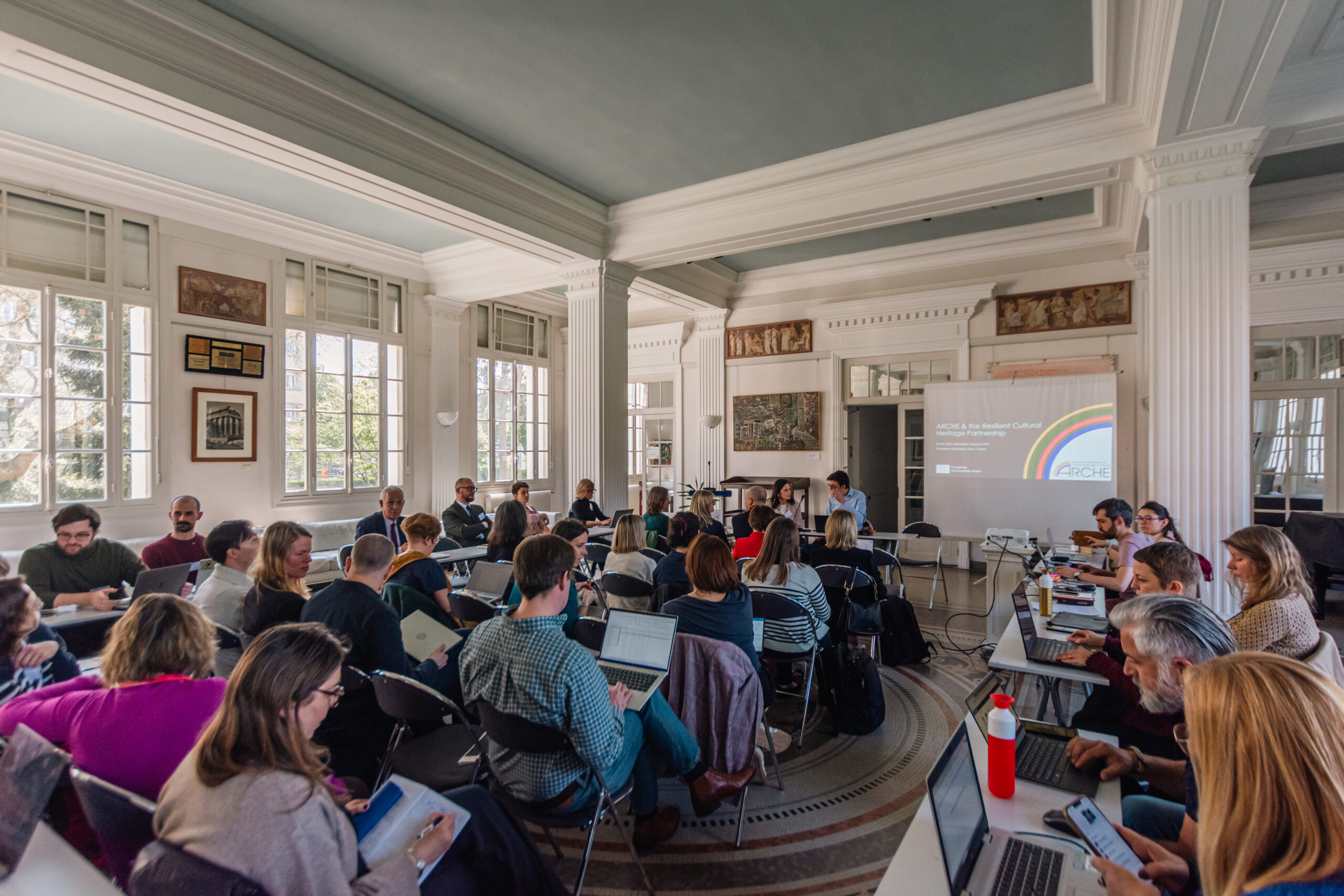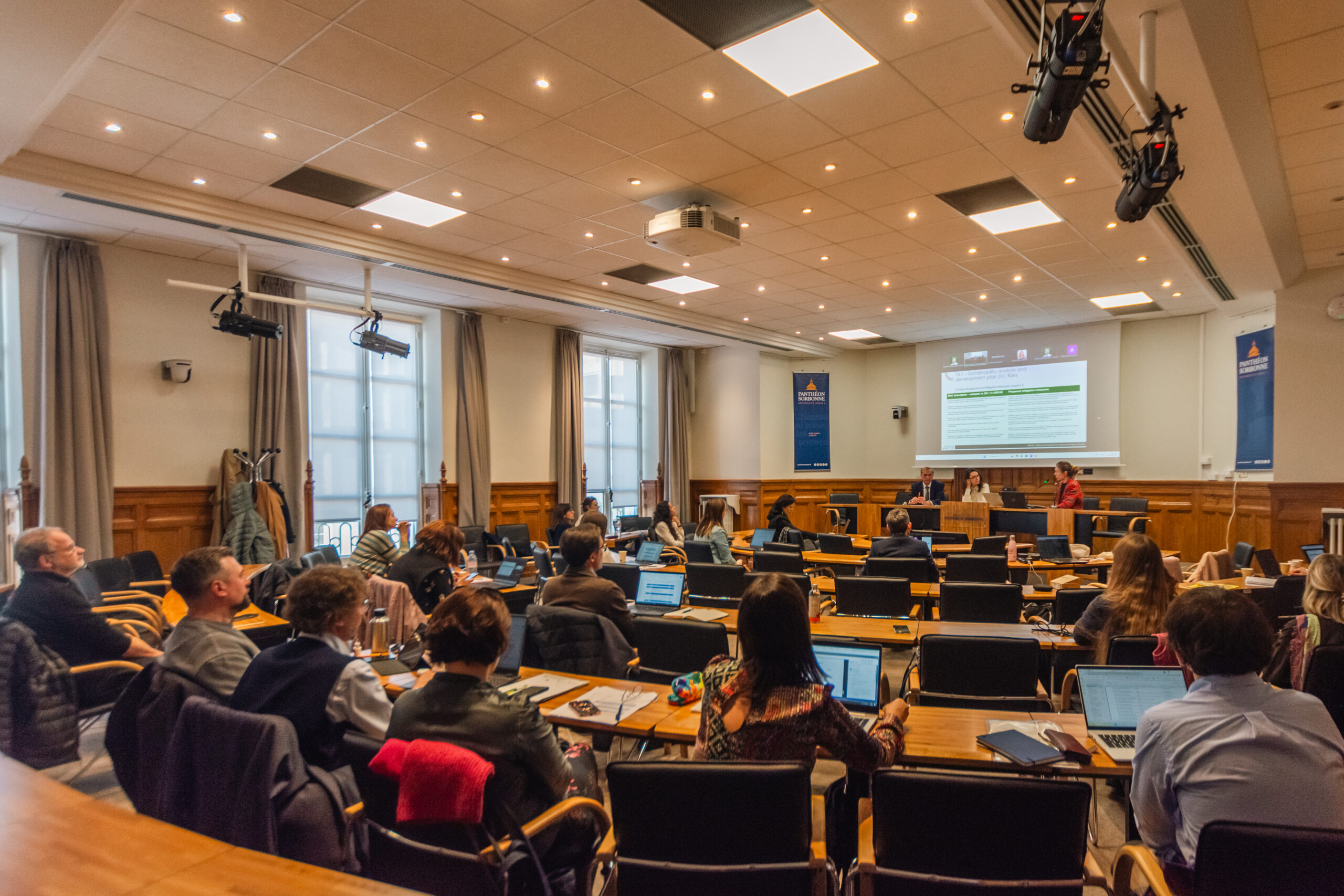The University of Paris 1 Panthéon-Sorbonne organised on April 9 and 10 at the Fondation Hellénique in the Cité internationale universitaire de Paris (CIUP) a workshop called “Reflecting on Academic Collaborations in Training, Networking and Monitoring”, within the framework of the Horizon Europe-funded ARCHE project (Alliance for Research on Cultural Heritage in Europe). The event engaged representatives from 9 European Universities Alliances and more than 30 individual academic institutions in thematic brainstorming sessions aimed at designing the additional activities of the upcoming European Partnership for Resilient Cultural Heritage (RCH). These activities have the role of complementing and boosting the impact of the transnational calls for research projects that will be launched during the RCH Partnership.
The workshop began with introductions given by prof. Maria Gravari-Barbas as the event host and Alexandre Caussé as the coordinator of the ARCHE project, the preparatory project for the future RCH Partnership.
The introductions were followed by a panel of three keynote speakers — Silvia Scaramuzzi from the University of Florence (Università di Firenze) who shared insights from the experience of the FutureFoodS Partnership regarding the implementation of observatories, Martina Massari from the University of Bologna (Alma Mater Studiorum – Università di Bologna) who helped participants delve into the world of Living Labs and Juliette Arabi from the French National Research Agency (Agence Nationale de la Recherche) and the Water4All Partnership, who provided valuable details about Knowledge Hubs. They highlighted structures built on bottom-up processes to foster alignment of visions and ambitions, and to support capacity building and the strengthening of relationships among the partners to increase efficiency and impact of the Partnership. Observatories and knowledge hubs are a key feature of such activities as they drive knowledge transfer and policy engagement, strengthen members skills through training and peer-learning sessions and offer a mechanism of reflexive monitoring of the Partnership to assess and improve its dynamics towards better policy advising activities. They also highlighted the importance of activities pertaining to the internationalisation and the widening of the Partnership, as well as to reaching local and scientific communities.
The four parallel sessions on Knowledge Hubs, Living Labs, Capacity Building and Widening Activities then punctuated the workshop and were animated by the keynote speakers together with Isidora Stanković and Ina Belcheva. European Universities Alliances and academic and research institutions representatives identified the different target audiences of the additional activities of the Partnership and highlighted the need to develop capacity building and awareness raising activities tailored for policy makers and administrations, be they at local, national or international levels. They discussed international enlargement strategies through developing non EU-centric narratives and cultural diplomacy as well as post-action and long-term collaboration tools. They emphasized their will to integrate and scale-up existing, or create new short term and long term training opportunities for cultural heritage researchers and professionals – such as joint master and PhD programmes, summer schools, training modules – that would ensure a continuous flow from research to training. Most of all, they laid the groundwork for new collaborations, to foster efficiency, and to increase the production and the circulation of knowledge to strengthen the resiliency of our cultural heritage and democratic societies facing environmental changes.
The event was followed by the consortium meetings of the ARCHE project, which focused on the progress made by the project in the past months, the preparations for the project’s last activities (since it will wrap up in September), as well as the next steps regarding the RCH Partnership. The meetings presented the latest version of the Strategic Research and Innovation Agenda (SRIA), the results of the five workshops that took place between October 2024 – April 2025 and the plans for the last event of this type, which will take place on 3-4 June 2025 in Ljubljana, Slovenia, with the aim of engaging countries in Southeastern Europe. The project will conclude in September 2025 with a public event and a policy roundtable, which will finetune the ARCHE policy recommendations. During the sessions focused on the Resilient Cultural Heritage Partnership, the team presented the state of the art regarding the future consortium and draft workplan for the upcoming RCH Partnership.
In addition to the workshop activities, participants also had the opportunity to visit the Cité Internationale Universitaire de Paris through expertly guided visits. Founded in the aftermath of the First World War, the Cité Universitaire was born as a pacifist utopia to foster international peace and multicultural encounters, exchanges and collaborations. Every year, it welcomes more than 12,000 students, researchers and artists of 150 nationalities into its 47 houses. Renowned creators and architects as Le Corbusier, Lê Phổ or Charlotte Perriand contributed to the exceptional architectural and artistic heritage of the Cité internationale. The three days of the ARCHE workshop and consortium meetings highlighted and celebrated the efforts behind strengthening the research & innovation community around cultural heritage, with a view towards establishing the project’s enduring legacy and setting up a solid framework for the upcoming ten years of the RCH Partnership.


